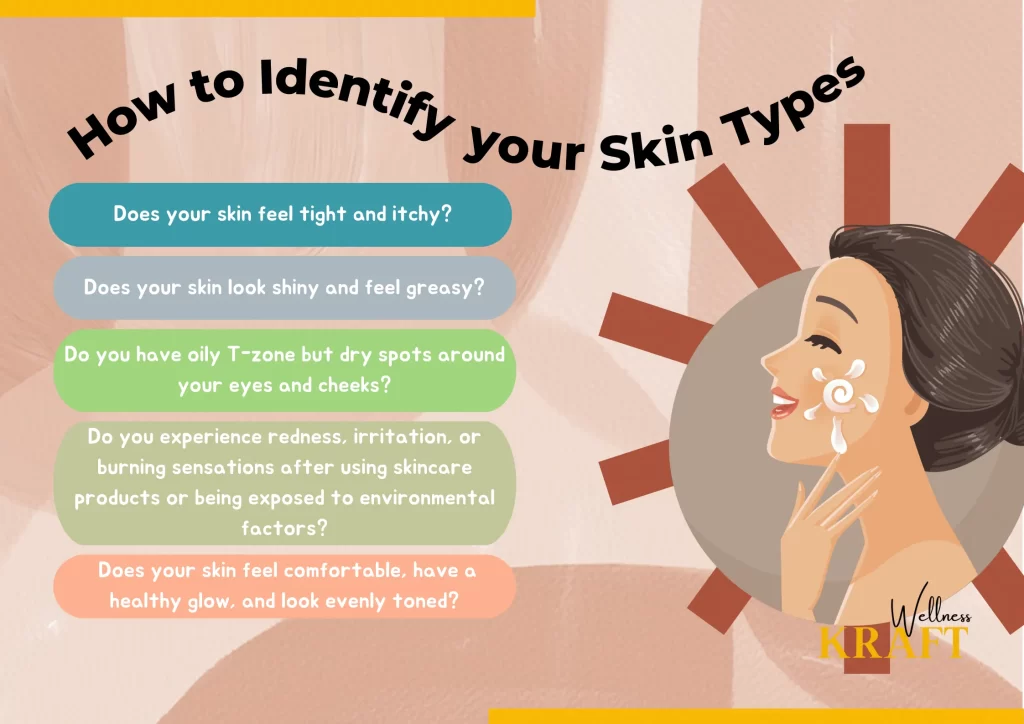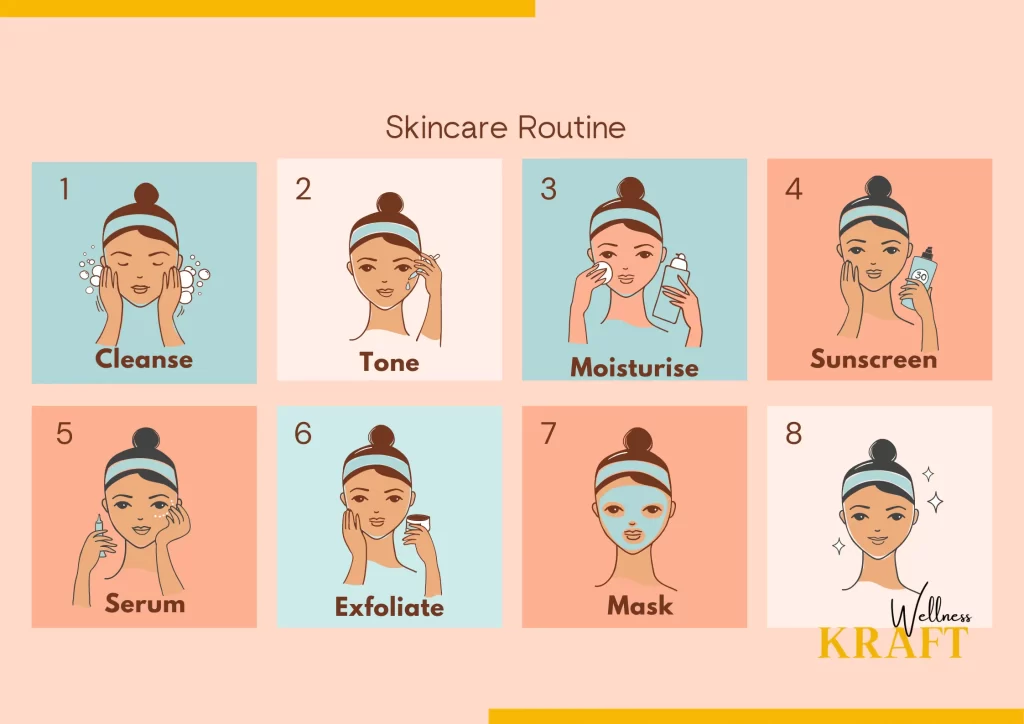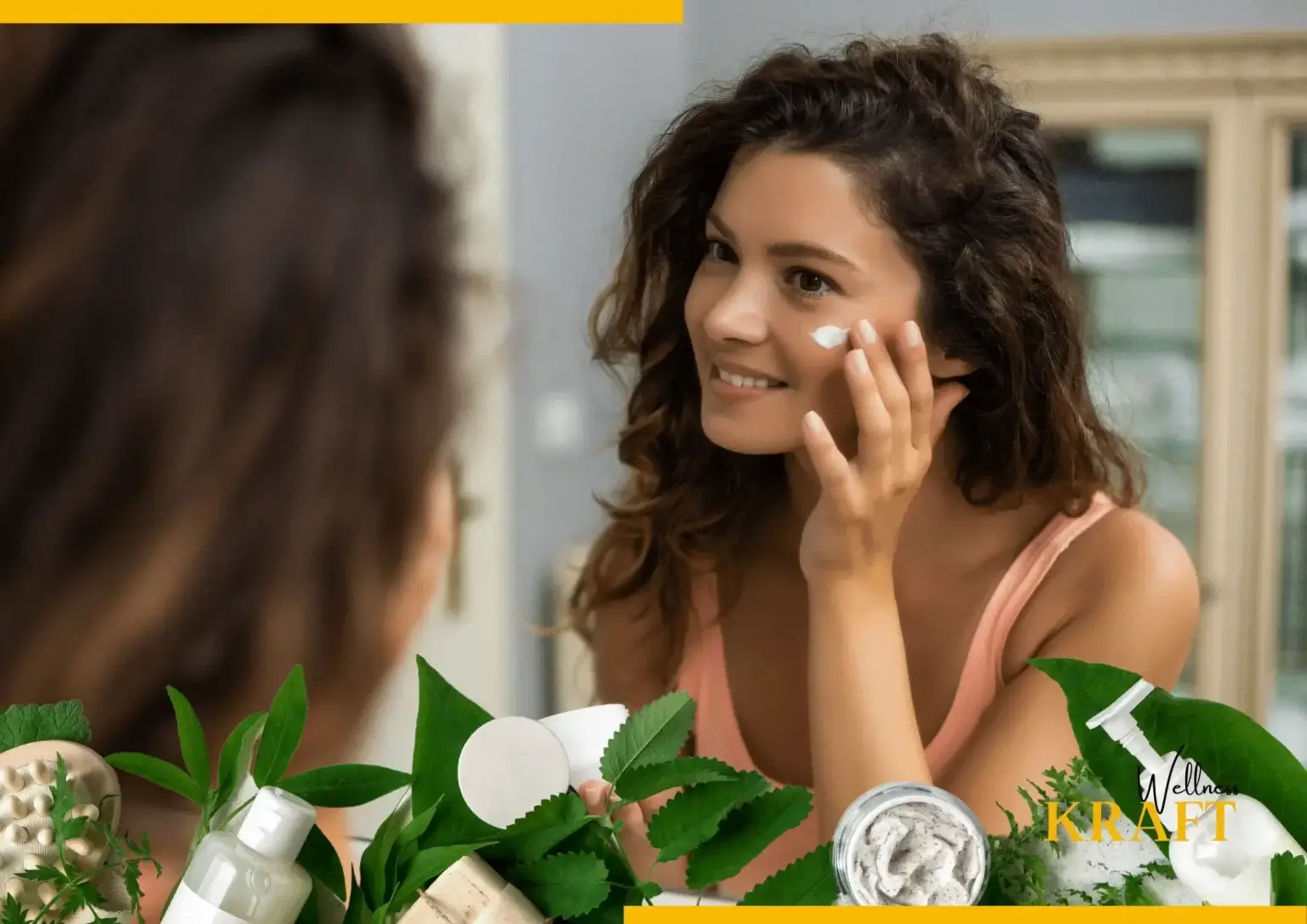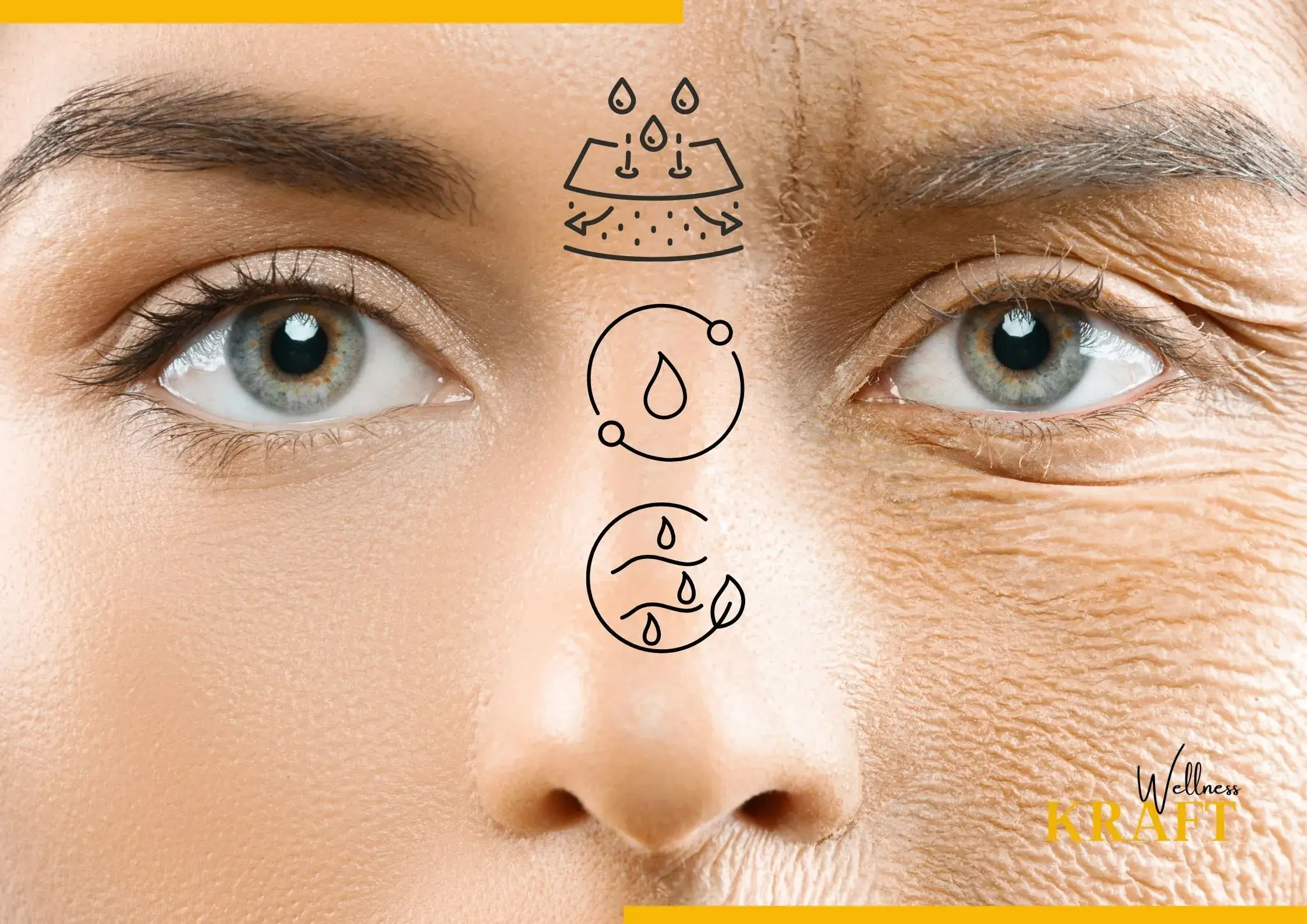“While genetics dictate your skin tone, lifestyle choices determine your skin’s health.” – Wellness Kraft
Table of Contents
Introduction
Your skin is your body’s largest organ and acts as a barrier between your body and the outside world. However, not all skin is created equal. Understanding your skin type is crucial in maintaining healthy, radiant skin. In this comprehensive guide, we’ll take a closer look at the different skin types, how to identify your own, and the best ways to care for it.
What Determines Skin Type?
Skin types is determined by genetics, but it can also be influenced by environmental factors such as climate, pollution, and lifestyle choices. These factors can affect the skin’s texture, appearance, and overall health.
The Five Main Skin Types
1. Normal Skin
Normal skin is characterized by a balanced oil and water content, small pores, and an even skin tone. It is the least problematic of all skin types and requires minimal care.
2. Oily Skin
Oily skin is characterized by an excess production of sebum, which can lead to enlarged pores, blackheads, and acne. People with oily skin often have a shiny complexion, especially in the T-zone (forehead, nose, and chin).
3. Dry Skin
Dry skin is characterized by a lack of moisture and oil, which can result in a tight, flaky, and itchy feeling. People with dry skin often have fine lines, wrinkles, and dull-looking skin.
4. Combination Skin
Combination skin is characterized by both dry and oily areas on the face. The cheeks and eye area tend to be dry, whereas the T-zone (forehead, nose, and chin) is typically oily.
5. Sensitive Skin
Sensitive skin is characterized by redness, irritation, and inflammation. It can be caused by genetics, environmental factors, or the use of harsh skincare products.
How to Identify Your Skin Types?

To identify your skin type, wash your face with a gentle cleanser and pat it dry. Wait for about 30 minutes without applying any skincare products. Afterward, examine your skin in a well-lit area and answer the following questions:
Q1. Does your skin feel tight and itchy?
A1. If yes, you have dry skin types.
Q2. Does your skin look shiny and feel greasy?
A2. If yes, your skin type is oily.
Q3. Do you have oily T-zone but dry spots around your eyes and cheeks?
A3. If yes, your skin type is combination.
Q4. Do you experience redness, irritation, or burning sensations after using skincare products or being exposed to environmental factors?
A4. If yes, your skin type is sensitive.
Q5. Does your skin feel comfortable, have a healthy glow, and look evenly toned?
A5. If yes, your skin type is normal.
Developing a Skincare Routine

Developing a skincare routine that works for you can be a daunting task. Nonetheless, it need not be complicated. A basic skincare routine should include a cleanser, toner, moisturizer, and sunscreen. Depending on your skin types and concerns, you can also include serums, exfoliators, and masks.
Step 1: Cleanse
The first step in any skincare routine is cleansing. Cleansing removes dirt, oil, and impurities from your skin, preventing clogged pores and acne breakouts. Choose a cleanser that is gentle and suited to your skin type.
Step 2: Tone
Toning is an essential step in maintaining healthy skin. Toners help balance your skin’s pH, remove any remaining dirt or impurities, and prepare your skin for moisturizer. Look for toners that are alcohol-free and suited to your skin type.
Step 3: Moisturize
Moisturizing is an essential step in any skincare routine. Moisturizers help keep your skin hydrated and prevent dryness and flakiness. Look for a moisturizer that is suited to your skin type and contains SPF for daytime use.
Step 4: Sunscreen
Sunscreen is an essential step in protecting your skin from harmful UV rays. Look for a broad-spectrum sunscreen with an SPF of at least 30 and apply it every day, even on cloudy days.
Step 5: Serums, Exfoliators, and Masks
Depending on your skin type and concerns, you can also include serums, exfoliators, and masks in your skincare routine. Serums are lightweight, concentrated formulas that target specific skin concerns. Exfoliators remove dead skin cells and reveal brighter, smoother skin. Masks can help hydrate, brighten, and soothe your skin.
The Best Ingredients for Your Skin Types
When it comes to skincare, it’s important to understand that not all skin types are created equal. What works for one individual may not be effective for another. The key to finding the right skincare products for your skin type is to look for ingredients that target your specific concerns. In this guide, we’ll take a closer look at some of the best ingredients for your skin types.
Ingredients for Dry Skin Types
If you have dry skin, it’s important to look for ingredients that provide hydration and nourishment.
Hyaluronic Acid
Hyaluronic acid is a powerful humectant that attracts and retains moisture, making it an excellent ingredient for dry skin. It can hold up to 1000 times its weight in water, helping to plump and hydrate the skin.
Ceramides
Ceramides are natural lipids that help maintain the skin’s barrier function, preventing moisture loss and keeping the skin hydrated. They also help protect the skin from environmental stressors and promote healthy skin cell turnover.
Glycerin
Glycerin is a humectant that attracts and retains moisture, making it an excellent ingredient for dry skin. It helps hydrate and soothe the skin, leaving it soft and supple.
Ingredients for Oily Skin Types
If you have oily skin types, it’s important to look for ingredients that help control oil production and prevent breakouts.
Salicylic Acid
Salicylic acid is a beta-hydroxy acid that helps exfoliate the skin, unclog pores, and control oil production. It’s an effective ingredient for preventing and treating acne breakouts.
Niacinamide
Niacinamide, also known as vitamin B3, is a powerful antioxidant that helps regulate sebum production and reduce inflammation. It also helps improve the skin’s barrier function and reduce the appearance of enlarged pores.
Witch Hazel
Witch hazel is a natural astringent that helps control oil production and reduce inflammation. It can also help soothe irritated skin and prevent breakouts.
Ingredients for Sensitive Skin Types
If you have sensitive skin, it’s important to look for ingredients that are gentle and non-irritating.
Aloe Vera
Aloe vera is a natural anti-inflammatory that helps soothe and calm sensitive skin. It’s also hydrating and helps promote healthy skin cell turnover.
Colloidal Oatmeal
Colloidal oatmeal is a natural ingredient that helps soothe and calm irritated skin. It’s also hydrating and helps improve the skin’s barrier function.
Chamomile
Chamomile is a natural anti-inflammatory that helps soothe and calm sensitive skin. It’s also a natural antioxidant that helps protect the skin from environmental stressors.
Ingredients for Aging Skin Types
If you have aging skin, it’s important to look for ingredients that help promote collagen production and reduce the appearance of fine lines and wrinkles.
Retinoids
Retinoids are a form of vitamin A that help promote collagen production, improve skin texture, and reduce the appearance of fine lines and wrinkles. They also help regulate sebum production and prevent breakouts.
Vitamin C
Vitamin C is a powerful antioxidant that helps protect the skin from environmental stressors and promote collagen production. It also helps brighten the skin and reduce the appearance of dark spots and hyperpigmentation.
Peptides
Peptides are amino acids that help stimulate collagen production and improve skin elasticity. They also help reduce the appearance of fine lines and wrinkles and improve skin texture.
Concluding Thoughts
Choosing the right ingredients for your skin types can make a big difference in the health and appearance of your skin. Our skin is our largest organ and the first line of defense against environmental stressors. The skin also helps regulate body temperature, protects us from harmful UV rays, and eliminates toxins from our body. However, our skin is constantly exposed to pollutants, free radicals, and harmful UV rays that can damage our skin’s barrier and cause premature aging.
A good skincare routine can help repair and protect our skin’s barrier, maintain its natural pH, and keep it hydrated. A regular skincare routine can also help reduce the appearance of fine lines, wrinkles, and dark spots. A consistent skincare routine is essential to achieving and maintaining healthy, glowing skin.
At Wellness Kraft, we understand the importance of healthy skin and offer a range resources to support your skincare journey. Our products are designed to cater to different skin types and provide nourishment, hydration, and protection to keep your skin looking and feeling its best.
However, taking care of your skin goes beyond just using the right products. A healthy diet, regular exercise, and stress management are also important for overall skin wellness. By prioritizing your skin’s health and wellness, you can achieve radiant and beautiful skin for years to come.
In conclusion, with the right knowledge, products, and lifestyle choices, you can maintain healthy and glowing skin, no matter your skin types. At Wellness Kraft, we are dedicated to helping you achieve your skincare goals and live your best life.
FAQs
1. Do I need to follow a skincare routine even if I have good skin?
Yes, a skincare routine is essential to maintaining healthy skin. Even if you have good skin, a regular skincare routine can help prevent premature aging, protect your skin from environmental stressors, and keep it hydrated.
2. Can I skip the toner step in my skincare routine?
No, toning is an essential step in maintaining healthy skin. Toners help balance your skin’s pH, remove any remaining dirt or impurities, and prepare your skin for moisturizer.
3. Can I use the same moisturizer for daytime and nighttime?
Yes, you can use the same moisturizer for daytime and nighttime.
4. How often should I follow a skincare routine?
You should follow a skincare routine every day, both in the morning and at night. Consistency is key when it comes to skincare, and following a routine regularly can help improve the health and appearance of your skin.
5. How do I choose the right skincare products for my skin type?
It’s important to choose skincare products that are formulated for your specific skin type. Look for products that contain ingredients that target your skin concerns, such as dryness, oiliness, or sensitivity. You can also consult with a dermatologist or esthetician for personalized recommendations.
6. Can I use the same skincare products in the morning and at night?
Yes, you can use the same skincare products in the morning and at night. However, it’s important to pay attention to the ingredients in your products and how they interact with each other. For example, you may want to use a lighter moisturizer in the morning and a heavier one at night.
7. How long does it take to see results from a skincare routine?
It can take several weeks or even months to see results from a skincare routine, depending on your skin concerns and the products you’re using. However, consistency is key, so it’s important to stick with your routine and give your skin time to adjust.
8. Do I need to use a toner?
While toner is not necessary for everyone, it can be beneficial for some skin types. Toners can help balance the skin’s pH, remove any remaining traces of dirt and oil, and prepare the skin for the next steps in your skincare routine.
9. How often should I exfoliate?
How often you should exfoliate depends on your skin type and the type of exfoliant you’re using. As a general rule, you should aim to exfoliate once or twice a week.
10. Do I need to use a moisturizer if I have oily skin?
Yes, you should use a moisturiser even if you have oily skin.Look for a lightweight, oil-free moisturizer that won’t clog your pores.









1 comment